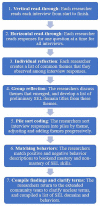Without Assumptions: Development of a Socio-Emotional Learning Framework That Reflects Community Values in Cameroon
- PMID: 34026701
- PMCID: PMC8137823
- DOI: 10.3389/fpubh.2021.602546
Without Assumptions: Development of a Socio-Emotional Learning Framework That Reflects Community Values in Cameroon
Abstract
Socioemotional learning (SEL) skills are the competencies that children need to be successful and accepted members of society. In this study, we built a SEL framework and a SEL measurement tool from the ground up that assess children's development of skills with communities of the Baka ethnic group in Cameroon. We conducted a participatory and interactive study to develop a SEL framework and measurement tool that is specific to the context of indigenous Baka communities in Cameroon. Using a quick ethnography methodology and an emic approach, a researcher team comprised mainly of Baka community members engaged parents, teachers, and others in iterative cycles of data collection, analysis, and reflection to develop the framework and assessments. The resulting Baka SEL framework includes skills and domains distinct from predominant SEL frameworks, underscoring the importance of drawing SEL priorities from communities themselves. Shared foundational constructs underlying the Baka SEL framework and other frameworks indicate possible universal human expectations for emotional and relational skills. Two SEL measurement tools were produced: a caregiver tool and a teacher tool, each using storytelling to elicit specific, honest, and detailed information about child behavior. These tools allow us to capture child behavior in the school and the home, and to collect data on all participating children within a specific time period. The described approach is a simple, practical, and culturally appropriate strategy for collaborating with rural communities to articulate their understanding of SEL. The resulting framework and tools illustrate the importance of rooting SEL in local culture, while the approach to developing them serves as a model for other early childhood care and education organizations and programs.
Keywords: Baka (Pygmies); Cameroon; assessments; community-based education; early childhood development; indigenous education; rapid ethnographic assessment; socioemotional learning.
Copyright © 2021 Anziom, Strader, Sanou and Chew.
Conflict of interest statement
The authors declare that the research was conducted in the absence of any commercial or financial relationships that could be construed as a potential conflict of interest.
Figures
References
-
- Darling-Churchill KE, Lippman L. Early childhood social and emotional development: advancing the field of measurement. J Appl Dev Psychol. (2016) 45:1–7. 10.1016/j.appdev.2016.02.002 - DOI
-
- Cooper J, Masi R, Whittaker JV. Social-Emotional Development in Early Childhood: What Every Policymaker Should Know. National Center for Children in Poverty (NCCP). (2009).
-
- Collaborative for Academic, Social and Emotional Learning . CASEL Guide: Effective Social and Emotional Learning Programs, Preschool and Elementary School Edition. (2012). Available online at: http://www.casel.org/preschool-and-elementary-edition-casel-guide/ (accessed December 2, 2020).
Publication types
MeSH terms
LinkOut - more resources
Full Text Sources
Other Literature Sources






